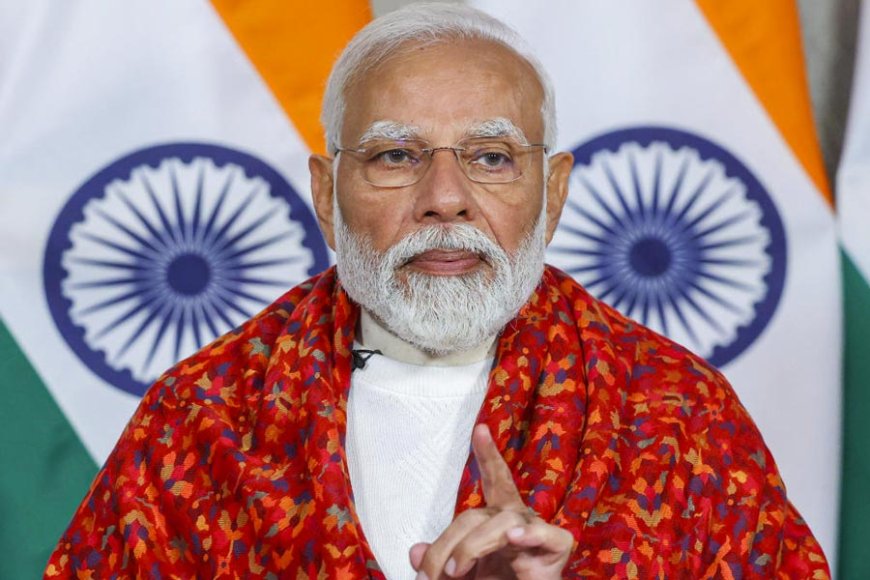Prime Minister Modi's Ode to Harmony: Praising Lord Ram through Nazrulgeeti in Bengal
Modi's Deliberate Move Sparks Political Discussion Ahead of Lok Sabha Elections

Prime Minister Narendra Modi praised Lord Ram in a song by Kazi Nazrul Islam two days before he dedicated the Ram temple in Ayodhya.
The devotion West Bengalis feel for Prabhu Shri Ram is enormous. The well-known Nazrul Geeti Mono Jopo Naam is seen here. #ShriRamBhajan, Modi posted on his X account along with a link to Payel Kar's Nazrulgeeti song on YouTube.
"Mono jopo naam/Shri Raghupati Ram, nava doorbadalshyam nayanaviram/Moo jopo naam/Shri Raghupati Ram," reads the opening line of the Bengali lyrics. (My heart is chanting Raghupati Ram's name; his striking appearance is soothing, like freshly sprung green grass).
Nazrul was born in Churulia, which is now in the West Burdwan region, in 1899. Because of his poetry against injustice, Nazrul gained the reputation of "Bidrohi Kabi (rebel poet)." However, the poet's songs and lyrics, as a representation of Bengal's syncretic culture, contain several Islamic works, bhajans and kirtans honoring Lord Krishna, and Shyama Sangeets (in worship of Goddess Kali).
According to a BJP official, Modi is deliberately trying to win over Bengal's votes before the Lok Sabha elections by using Nazrulgeeti.
The BJP representative said that Modi's attempt to forge a relationship between Bengal and Nazrul is just another way to engage the people in the state where his party is underrepresented and hopes to improve its performance in the 2019 Lok Sabha, which consists of 18 seats.
The Prime Minister made a deliberate choice to designate a Nazrulgeeti, according to BJP leaders. They said that while Modi intended to communicate that a Muslim poet had penned a song honoring Lord Ram, the Trinamul was attempting to divert attention from the Ram temple ceremony by planning interfaith gatherings on January 22.
"Modiji emphasized Bengal's relationship with Ram and chose a poet who is not Hindu to illustrate it. According to a state BJP official, "It conveys a message that Lord Ram is not new to the state but has been revered throughout history."
Muslim tar nayan mani, Hindu tahar pran, mora eki brinte duti kusum Hindu-Musalman. The national poet of Bangladesh, Nazrul, also penned, "(We are two flowers on one stalk, one is a Hindu and another is a Muslim/ While Muslim is the pupil of the eye, Hindu is the soul)."
Mamata Banerjee and other Trinamul leaders often use the song to highlight how amity is the foundation of Bengali culture.
"If we accept Mora eki brinte duti kusum Hindu-Musalman as one of Nazrul Islam's greatest compositions, then what is the issue with recognizing that the same poet was devoted to Ram?" questioned Samik Bhattacharya, the main spokesman for the Bengal BJP.
"Nazrul has several invocations to Kali and other Hindu gods, goddesses — but these are expressions of his secular heart — not any support for narrow fundamentalists!" Trinamul Rajya Sabha MP Jawhar Sircar wrote on X, opposing Modi's attempt to take Nazrul.
In my opinion, the Prime Minister's attempt indicates his desperate attempt to establish a rapport with Bengal. I believe he is furious at Bengal. Pabitra Sarkar, a scholar, said that "he tried very hard to uncover a song about Ram by Nazrul, which is unusual...," and that "those who thought Nazrul was a devotee of Ram should realize that the poet was really impoverished and used to make songs for his "survival."
President of Chhayanat, a group renowned for its study on Nazrul, Somerita Mallik, a vocalist of Nazrulgeeti, stated: "He didn't confine himself to composing only devotional songs for both Hindus and Muslims, he wrote extensively on freedom, love, and revolution." He was against intolerance in all its manifestations."





















































